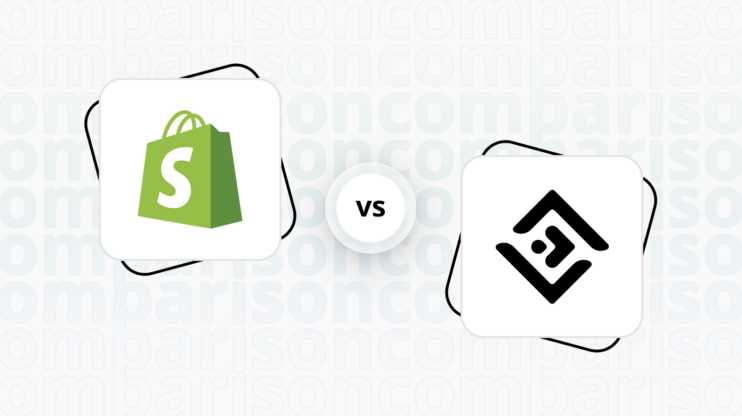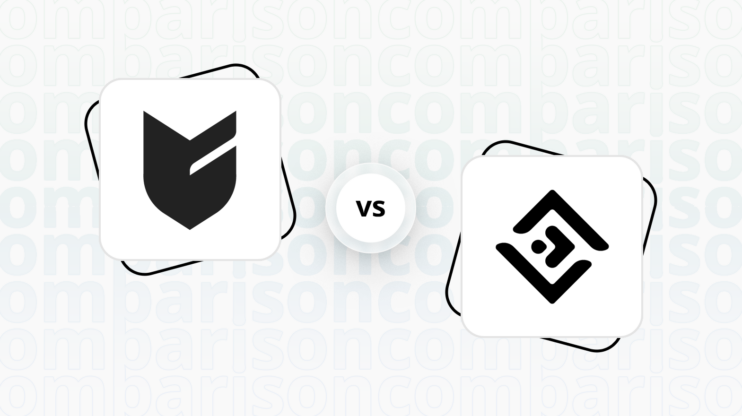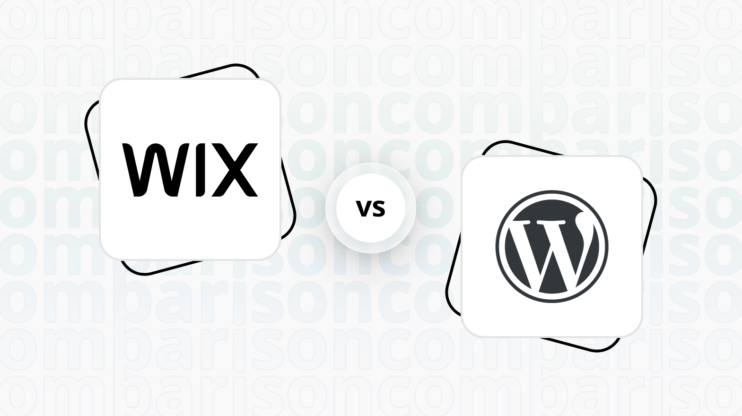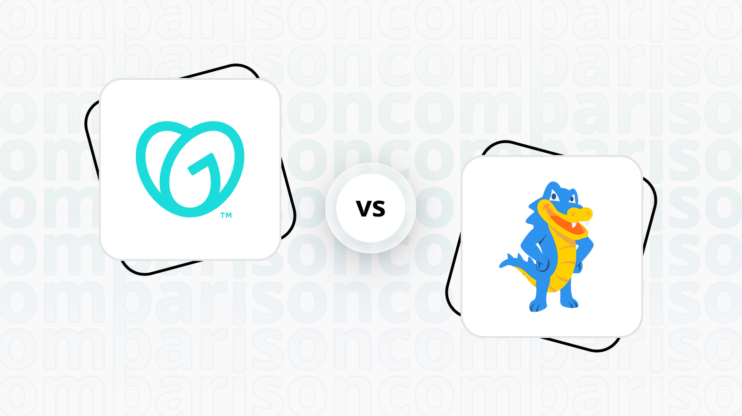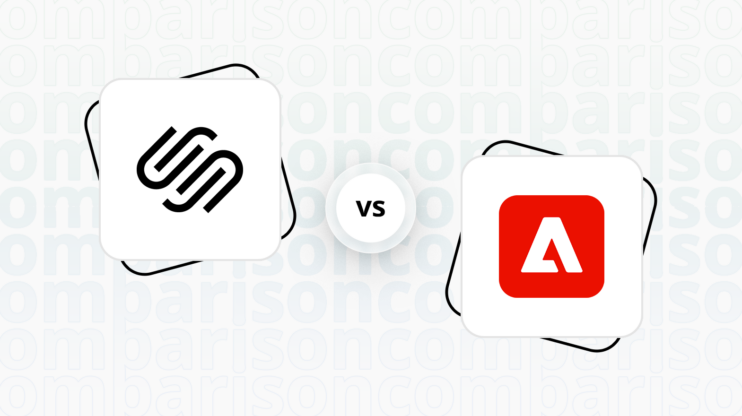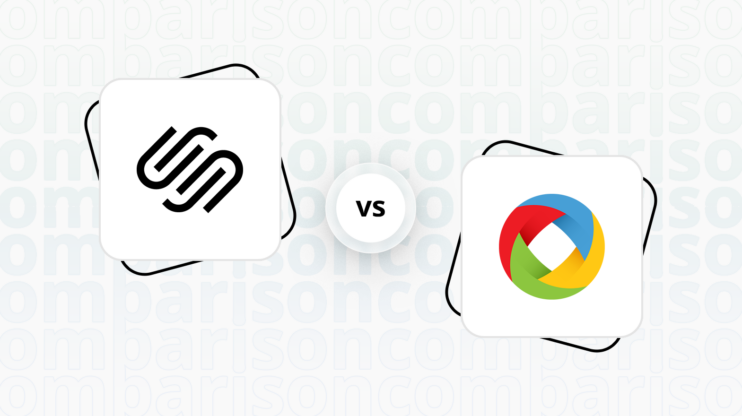Final verdict
When comparing Shopify and Big Cartel, it’s evident that each platform serves different market segments with distinct needs.
-
Shopify (Overall Grade: 8.1/10)
excels as a comprehensive ecommerce solution designed to support businesses of all sizes, from startups to large enterprises. Its strengths lie in its robust ecommerce features, extensive app marketplace, superior design capabilities, and strong support for SEO and marketing. Shopify’s platform is ideal for users looking for scalability, advanced features, and a wide range of integrations to grow their online business. -
Big Cartel (Overall Grade: 5.8/10)
, on the other hand, is tailored for artists, makers, and small retailers. It shines with its simplicity, ease of use, and affordability, making it a great choice for those just starting out or with a limited number of products. While it lacks the depth of features and scalability offered by Shopify, Big Cartel provides a straightforward and user-friendly platform for small-scale sellers to establish an online presence quickly.

|

|
|
|---|---|---|
| Design Functionalities & Templates |
8.2 |
6.9 |
| Ease of use |
7.5 |
8.0 |
| Ecommerce |
9.2 |
6.2 |
| Website Editors |
7.9 |
6.8 |
| Product Testing Options |
8.1 |
5.9 |
| Price |
8.2 |
7.8 |
| Hosting Quality |
9.0 |
5.0 |
| Website Speed Optimization |
7.8 |
5.0 |
| Plugins and Integrations |
8.7 |
5.8 |
| Marketing Features |
8.8 |
6.2 |
| Customer Support |
8.6 |
5.4 |
| Security |
9.0 |
7.3 |
| AI Capabilities |
7.9 |
0.0 |
| User Management |
6.5 |
1.3 |
| Overall |
8.1 |
5.8 |
Best for ecommerce
 9.2
9.2
 6.2
6.2
Verdict
: For businesses aiming for growth and scalability, Shopify is the superior choice with its comprehensive ecommerce features. Big Cartel, while user-friendly and cost-effective, is better suited for artists and small vendors.
-
Shopify
: With a score of 9.2, Shopify stands out for its robust ecommerce capabilities, including advanced inventory management, a wide range of payment gateways, and extensive marketing tools. It’s designed to support businesses at every stage of growth. -
Big Cartel
: Scoring 6.2, Big Cartel is tailored for simplicity and ease of use, making it ideal for artists and small-scale sellers. While it offers essential ecommerce features, it lacks the depth and scalability provided by Shopify.
Best for informational & business websites
 6.8
6.8
 7.2
7.2
Verdict
: Big Cartel edges out Shopify for informational and business websites, particularly for artists and small creators looking for simplicity and ease of use.
-
Shopify
: Shopify’s robust ecommerce features can be adapted for informational business websites, but its complexity and focus on online stores might not be ideal for all users. It offers a wide range of design functionalities and templates, making it a versatile choice for those who need more advanced features. -
Big Cartel
: Big Cartel’s straightforward setup and artist-focused design make it a better choice for informational sites for small businesses and independent creators. Its ease of use and focus on simplicity over complex ecommerce functionalities cater well to those looking for an effective online presence without the need for extensive customization or advanced features.
Detailed comparison
Design functionalities & templates
Design FunctionalitiesRepresents how well each platform allows for creative design and customization of websites.Score Components:
- Template Variety (30%): Range and quality of design templates.
- Customization (30%): Flexibility and options for design alterations.
- User Interface (20%): Ease and intuitiveness of the design process.
- Responsiveness (10%): Adaptability to different devices and screen sizes.
- Innovation (10%): Unique design features and tools.
 8.2
8.2
 6.9
6.9
Winner: Shopify.
If you’re looking for a platform that offers more advanced and diverse design features and templates, Shopify is the preferred choice.
Shopify’s templates are sleek and professional, ideal for ecommerce sites. They offer a sophisticated look with a focus on online stores. While the free template selection is not large, Shopify’s premium theme store provides a variety of industry-specific options, offering advanced features for a strong brand presence.
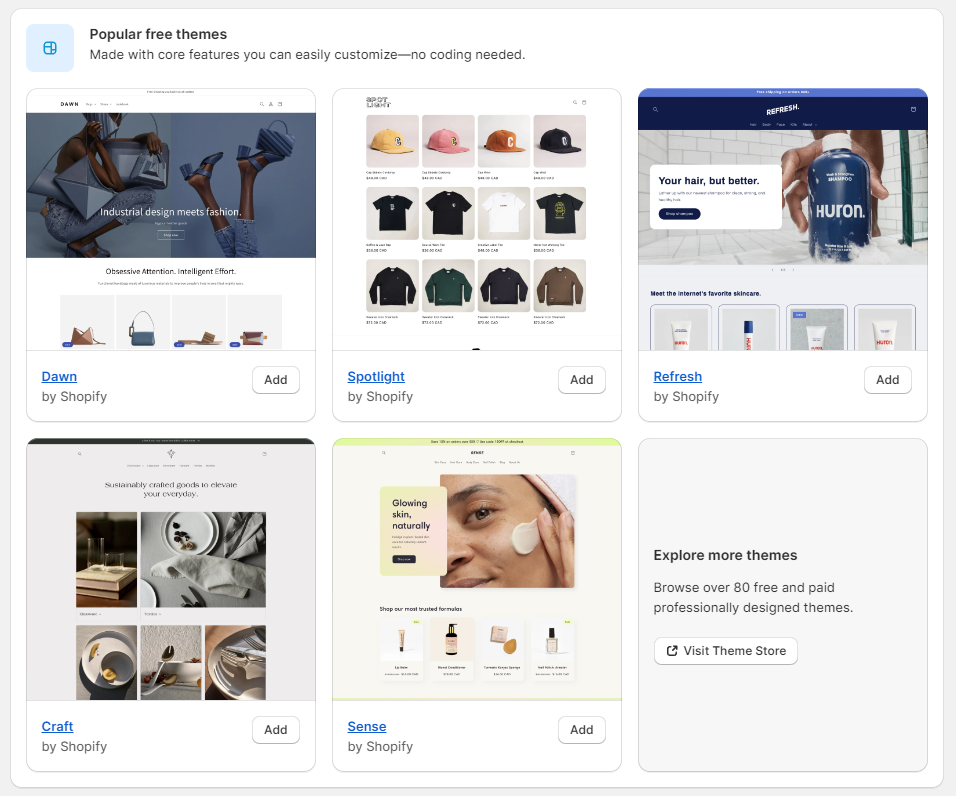
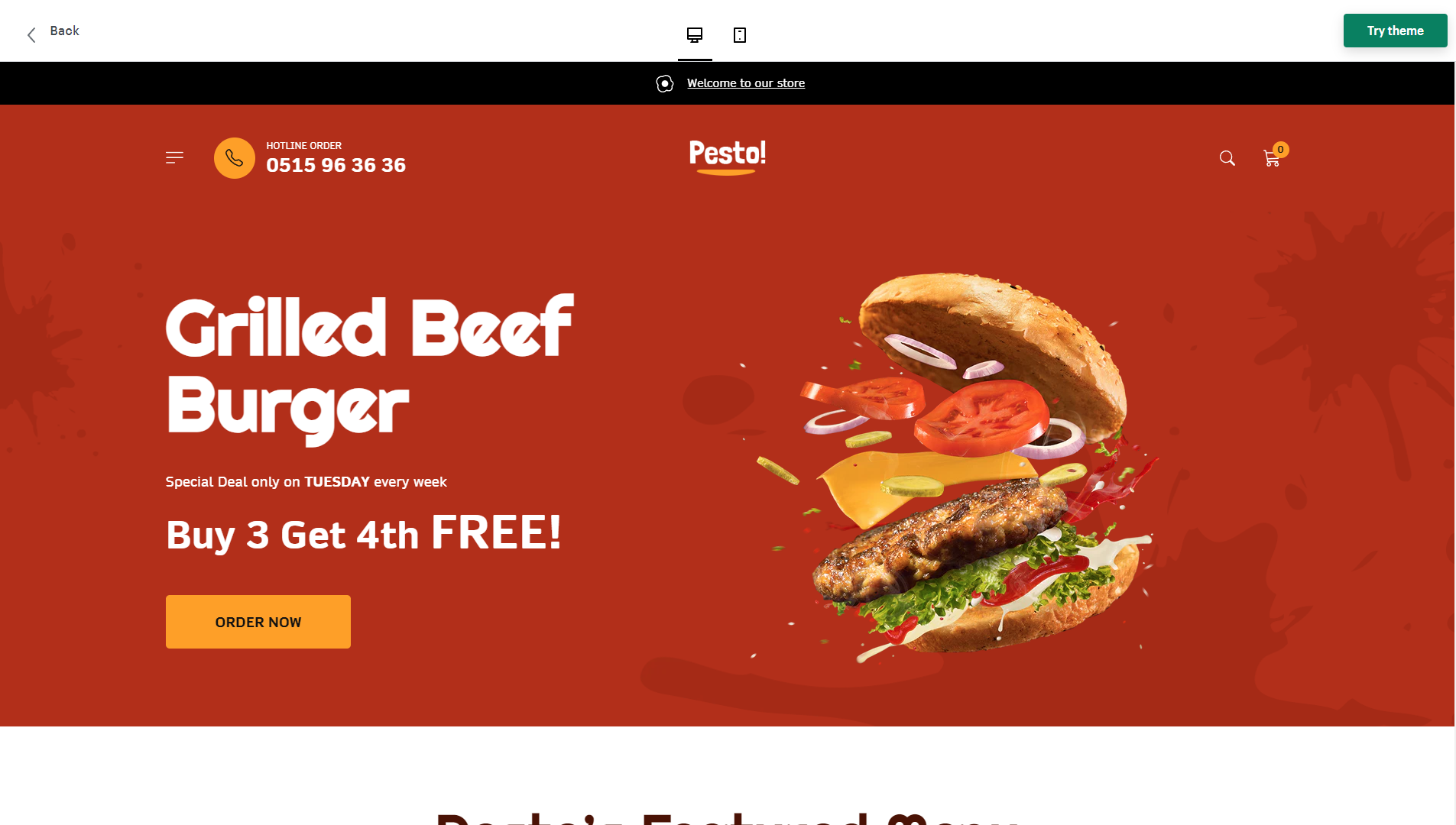
Compared to Shopify, Big Cartel provides a variety of free, customizable templates designed to ensure that online stores look appealing on all devices. These templates are geared towards artists, creators, and small business owners, offering features like high-quality product displays and adjustable product grids without the need for coding knowledge.
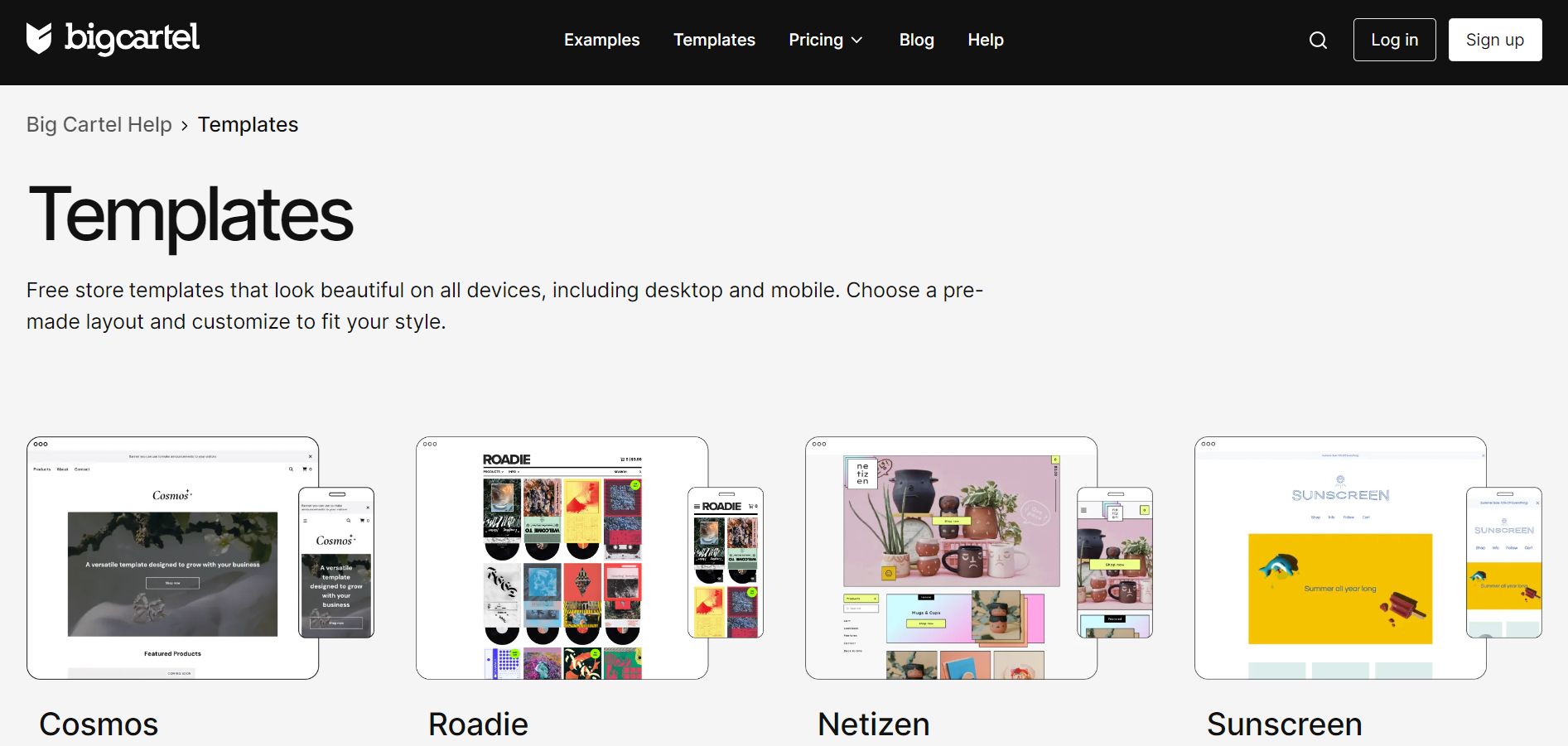

Get a head start on website creation with AI
Create a custom website tailored to your business needs 10X faster with 10Web AI Website Builder!
Ease of use
Ease of useReflects the platform’s overall user-friendliness.Score
Components:
- Learning curve (40%): Quickness and ease of getting started.
- Interface design (30%): Simplicity and intuitiveness of layout.
- User guidance (20%): Quality of tutorials and support.
- Flexibility (10%): Adaptability to various user skills.
 7.5
7.5
 8.0
8.0
🏆 Winner: Big Cartel
. With a score of 8.0, Big Cartel is designed with simplicity in mind, making it particularly accessible for artists and small-scale sellers who may not have extensive technical skills. Shopify, scoring 7.5, offers a robust platform but with a steeper learning curve, especially for those new to ecommerce. If ease of use is a priority, Big Cartel is the clear winner in this category.
Learning Resources
🏆 Winner: Shopify
. While both platforms offer solid learning resources, Shopify goes a step further with its wide array of detailed tutorials and active community forums, making it easier for users to learn and adapt.
For ecommerce
EcommerceMeasures the platform’s effectiveness in supporting online business activities.Score Components:
- Ecommerce themes and templates (20%): Variety and design of templates.
- Product management (25%): Ease of managing and organizing products.
- Payment options (25%): Variety and convenience of payment methods.
- Ecommerce features (20%): Features for managing an ecommerce store.
- Integration (10%): Compatibility with external e-commerce tools and services.
 9.2
9.2
 6.2
6.2
Shopify is a leading ecommerce platform with a comprehensive set of features for online businesses. It offers tools for creating and customizing online stores, managing products, processing payments, and handling order fulfillment. On the other hand, Big Cartel is tailored for artists and makers, offering features that support small businesses in setting up an online store. However, Big Cartel’s ecommerce capabilities are more limited compared to Shopify, making it less suitable for businesses looking to expand their online presence significantly.

|

|
|
|---|---|---|
|
Ecommerce themes and templates |
8.2 |
5.5 |
|
Product page customization |
8.5 |
6.8 |
|
Payment processing and commissions |
8.8 |
7.0 |
|
POS capabilities |
8.1 |
6.5 |
|
Payment gateways |
9.5 |
6.0 |
|
Product numbers |
9.0 |
4.5 |
|
Additional ecommerce features |
9.1 |
5.7 |
Shopify ecommerce features:
- Comprehensive store builder
- Shopify Payments and other gateways
- Advanced inventory management
- Multi-channel selling
- Abandoned cart recovery
- Detailed analytics and reporting
Big Cartel ecommerce features:
- Inventory tracking
- Sales analytics
- Social Media integrations
- Marketing tools
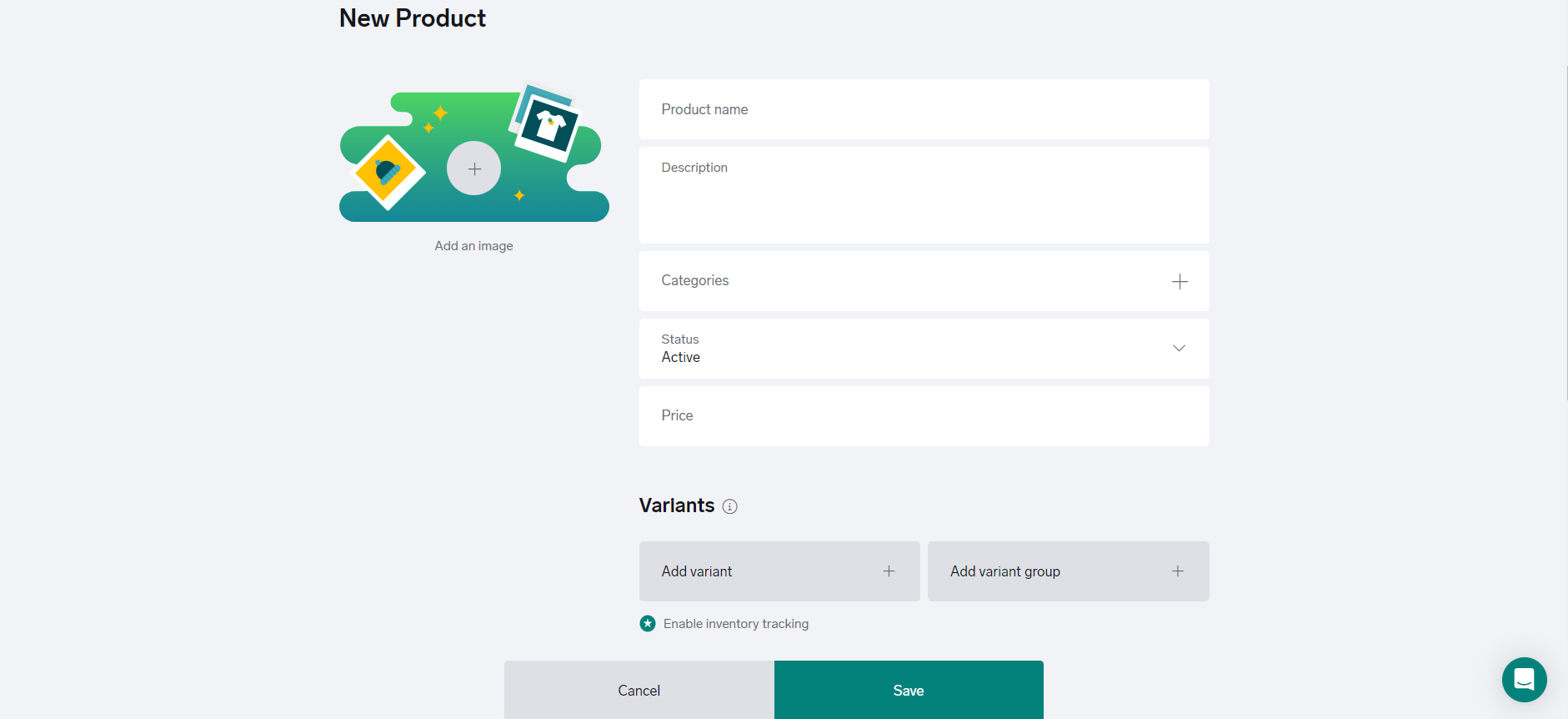
Ecommerce themes & templates
Shopify offers about 150 modern responsive themes for creating a virtual storefront, ensuring a good look on both desktop and mobile devices. While some themes are free, others cost between $170 to $380. In contrast, Big Cartel offers around 20 templates, each specifically designed to cater to the needs of ecommerce stores, providing a variety of options for creating an online store.
Product page customization
Shopify has a limit of three options per product, totaling 100 unique variations. This limit may not pose a significant constraint, and it is suggested that for products with numerous options, creating separate listings on Shopify can be a more manageable approach. While Shopify offers titles, descriptions, and image galleries with zoom effects, customization options like adding ribbons, size charts, and wishlists are not as straightforward. However, Shopify distinguishes itself with additional features through its extensive library of extra apps, offering functionalities like reviews, Facebook stores, eBay item importers, and a unique Augmented Reality feature for an enhanced customer experience.
On the other hand, Big Cartel enables merchants to customize their product offerings with the Product Variants feature, supporting up to 150 variants per item, such as sizes, colors, and more, allowing for specific pricing and quantities for each variant. Additionally, for products with complex attributes, the Advanced Product Options offer a structured way to present multiple variations through up to three option groups per product, simplifying the shopping experience.
Payment processing
When it comes to payment processing, Shopify offers payments with typical charges of
2.9% + 30¢
per online transaction on basic plans, and lower fees for higher-tier plans. However, it adds extra fees for using other payment gateways. Shopify Payments is Shopify’s own payment processing gateway. It allows merchants to accept credit card payments directly on their store without having to integrate third-party payment providers. This simplifies the payment process, reduces transaction fees, and streamlines the handling of finances.
Big Cartel supports payment processing through PayPal and Stripe, allowing a variety of payment methods including credit/debit cards and mobile payments like Apple Pay and Google Pay. The platform itself does not charge additional transaction fees, but standard processing fees from PayPal and Stripe apply. Big Cartel also offers POS capabilities, primarily through Stripe terminal for Android and iOS for in-person sales, enhancing flexibility for both online and offline business operations.
Website Editors
Website EditorsEvaluates the platforms’ website building and editing capabilities.Score Components:
- Customization tools (40%): Range and power of editing features.
- Editor usability (30%): User experience within the editor.
- Design flexibility (20%): Freedom in layout and design changes.
- Update and maintenance ease (10%): Simplicity of updating and maintaining the site.
 7.9
7.9
 6.8
6.8
🏆
Winner: Shopify
. Shopify’s editor, with a score of 7.9, excels in providing a streamlined, ecommerce-focused editing experience. It’s particularly beneficial for users who prioritize efficient management of online stores. The editor is straightforward, making it easy to add products, manage inventory, and set up payment methods. Shopify’s editor is optimized for sales and business growth, with built-in tools specifically designed for ecommerce businesses.
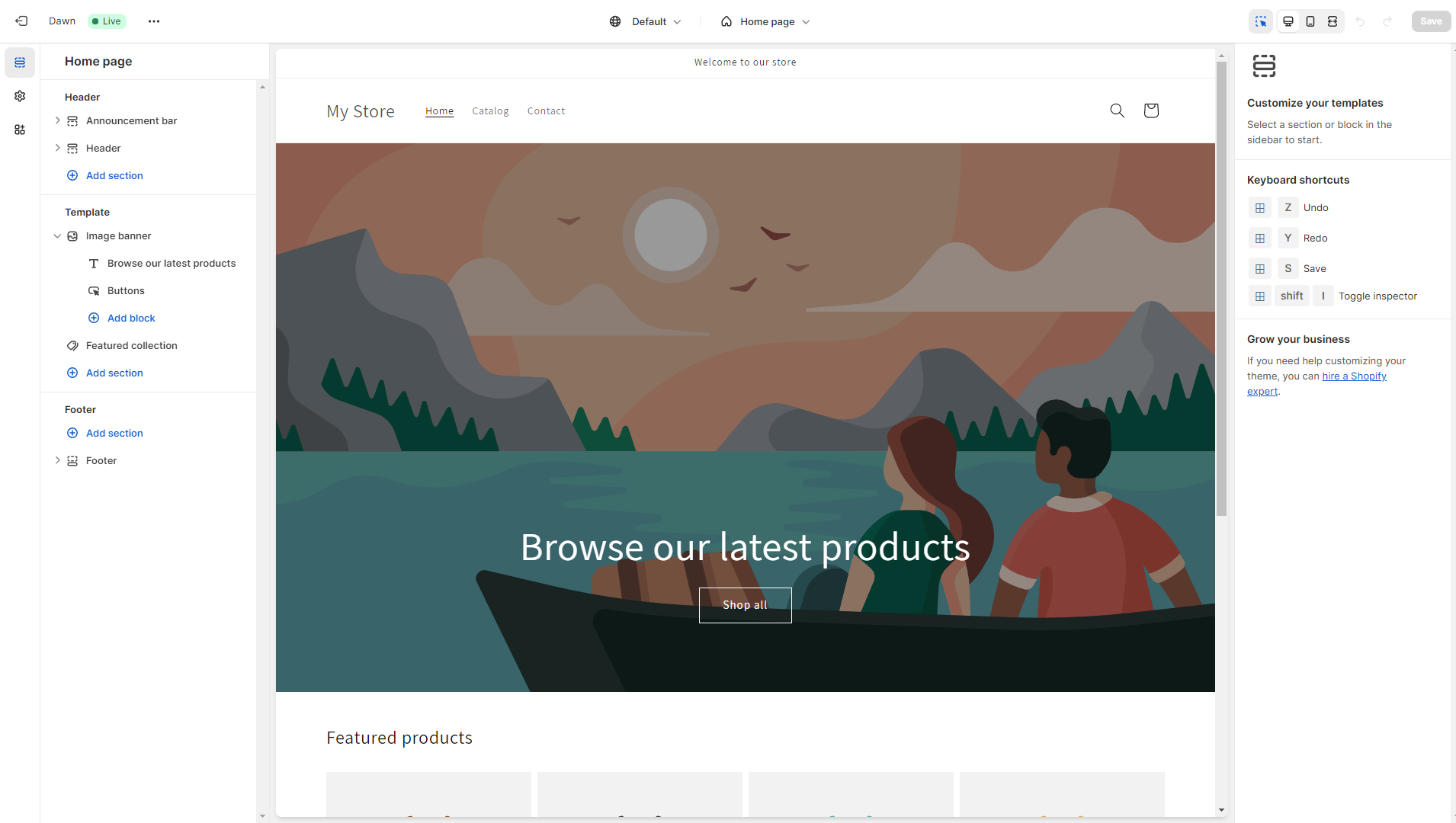
Big Cartel’s website builder editor, scoring 6.8, is designed with simplicity in mind, catering primarily to artists and small-scale sellers. Users can easily customize their online store’s look and feel without needing advanced technical skills, thanks to its user-friendly interface. The editor allows for the customization of themes, addition of products, and setup of different pages like home, about, and contact pages. Additionally, it offers basic SEO settings and integration options with social media and other tools, making it a straightforward solution for those looking to sell their work online with minimal fuss.
Mobile editor/app
 8.0
8.0
 7.5
7.5
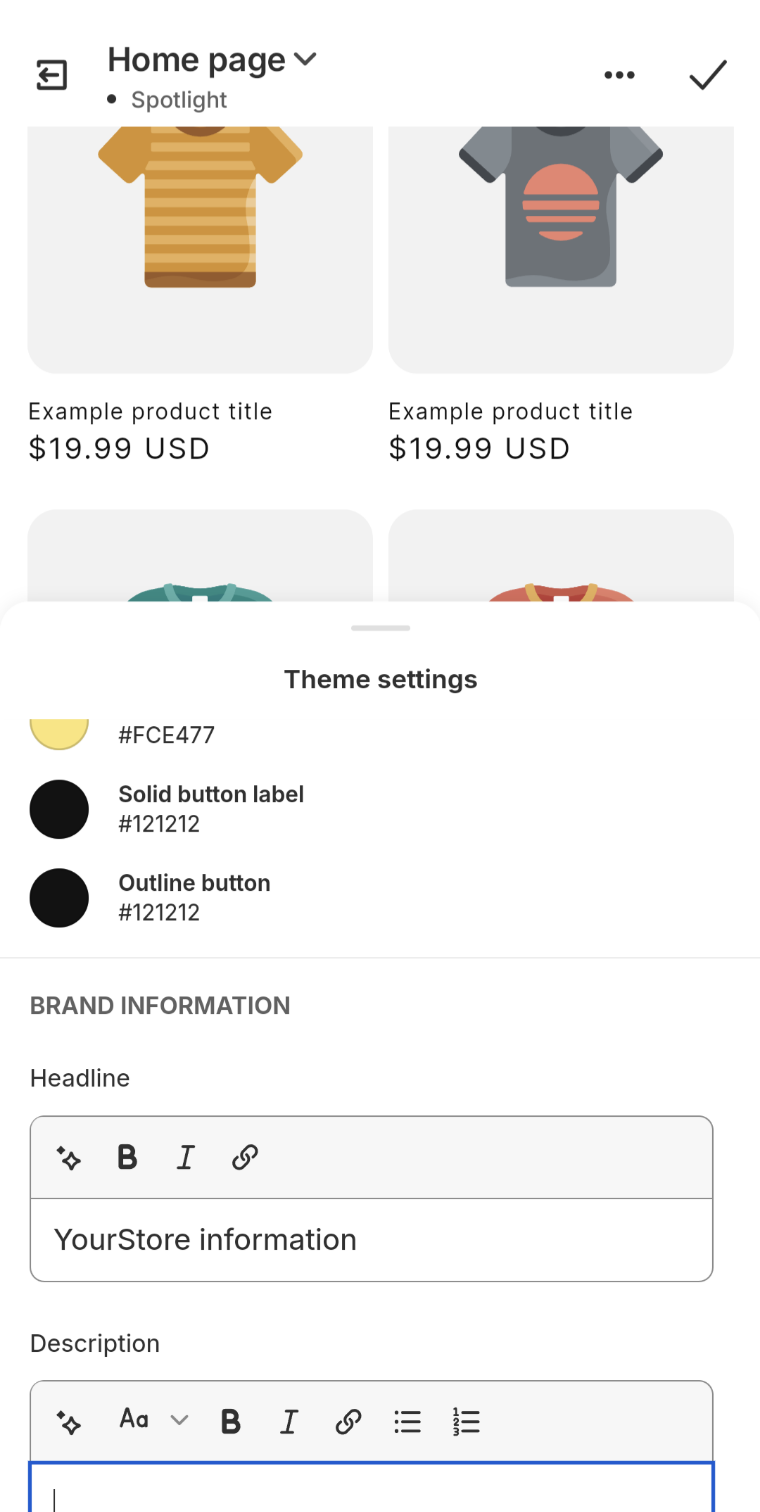

🏆
Winner: Shopify
. Both Shopify and Big Cartel offer mobile apps for managing your online store on the go. However, they differ in their mobile editing capabilities.
Shopify’s mobile app includes a user-friendly mobile theme editor that allows users to customize their online store website directly from their mobile device. This feature enables the addition, removal, editing, and rearrangement of content on the store’s website, offering convenient on-the-go adjustments to the store’s appearance and layout.
On the other hand, Big Cartel’s mobile app allows users to manage their online store directly from their mobile device, with features such as adding and editing products, processing orders, checking inventory, and viewing store statistics. However, it does not support website design changes, which can only be applied on the desktop version.
In summary, while both platforms offer robust mobile management features, Shopify’s mobile app provides more comprehensive editing capabilities, making it the winner in this category.
Product testing options
Product Testing OptionsAssesses the options for trying out platform features before commitment.Score Components:
- Trial quality (40%): Extent and usefulness of the trial or free version.
- Feature accessibility (30%): How many features are available to test.
- Trial duration (20%): Length of the trial period.
- Ease of transition (10%): Smoothness of moving from trial to paid plans.
 8.1
8.1
 5.9
5.9
Overall Result
:
Shopify wins
. Shopify scores 8.1, offering a 14-day free trial with access to all features, while Big Cartel scores 5.9, offering a free version with limited features and no trial or money-back guarantee.

|

|
|
|---|---|---|
|
Free Plan |
No (14-day free trial) | Yes |
|
Trial Duration |
14 days | No trial |
|
Testing Premium Features |
All features during free trial |
Limited features with free plan |
|
Money Back Guarantee |
Yes |
No |
Price
PriceLooks at the cost-effectiveness and value for money of each platform.Score Components:
- Plan value (40%): What each pricing tier offers.
- Transparency and clarity (30%): Clearness of pricing structures.
- Flexibility of plans (20%): Range of options to suit different budgets.
- Hidden costs (10%): Additional expenses not included in the plan.
 8.2
8.2
 7.8
7.8
Shopify offers more comprehensive features and pricing plans, but Big Cartel is a more affordable option, especially for small businesses and independent creators.

|

|
|
|---|---|---|
|
Free |
No offering at this amount. |
Gold ($0/month): The Gold plan is free and allows up to 5 product listings with one image per product. It includes features such as free customizable templates, the ability to sell online and in person, multiple payment options, real-time stats, product variant groups, and sales tax autopilot. |
|
$0-$10 |
No offering at this amount. |
Platinum ($9.99/month): The Platinum plan increases the product listing limit to 50 and allows up to five images per product. It adds features like the use of a custom domain, template code editing, Google Analytics, ads support, inventory tracking, the ability to offer discounts and run promos, bulk editing, and shipment tracking. Value for price: 7.5 |
|
$15-$30 |
Shopify Basic ($29/month): Unlimited products, 2.9% + 30¢ card fee with Shopify payments, Extra 2% gateway fee without Shopify Payments, Abandoned cart recovery, Automated sales tax, Digital products, POS Integration, 2 staff accounts. Value for price: 8.0 |
Diamond ($19.99/month): The Diamond plan further extends the product limit to 500 with the same benefits as the Platinum plan, including advanced Google Analytics reporting, ads with audience targeting, and priority customer support. Value for price: 8.5 |
|
$70-$80 |
Shopify Standard ($79/month): Lower card fees (2.6% + 30¢), Gift cards, Professional reports, 5 staff accounts. Value for price: 8.5 |
No offering at this amount. |
|
$200+ |
Advanced Shopify ($299/month): Lowest card fees (2.49% + 30¢), Advanced report builder, Real-time carrier shipping, Up to 15 staff accounts Value for price: 8.8 |
No offering at this amount. |
location. As a result in rare cases the prices displayed here can differ from the ones you see on their
websites.
Hosting quality
Hosting
qualityExamines the reliability and performance of the hosting solutions.Score Components:
- Uptime (40%): Consistency and reliability of website availability.
- Speed (30%): Loading times and performance.
- Bandwidth and storage (20%): Sufficiency of resources provided.
- Data centers (10%): Quality and distribution of hosting infrastructure.
 9.0
9.0
 5.0
5.0
Winner: Shopify
. Shopify provides a comprehensive hosting service with a 99.99% uptime guarantee and five global data centers. In contrast, Big Cartel does not provide specific information about its hosting services, including the type of hosting, uptime, uptime guarantee, and data centers. This lack of transparency gives Shopify a clear advantage in this comparison.

|

|
|
|---|---|---|
|
Do they offer hosting? |
Yes, included in all paid plans |
Yes, included in all paid plans |
|
Data Centers: |
5 globally: USA (Ashburn, Virginia; Santa Clara, California), Canada (Toronto, Ontario), Ireland (Dublin), and Singapore |
Big Cartel does not disclose any information about their data centers |
|
Type of hosting: |
Proprietary cloud-based hosting |
Big Cartel does not explicitly mention any information on their hosting |
|
Uptime: |
99.99% |
Big Cartel does not disclose statistics on their uptime |
|
Uptime Guarantee: |
Yes, 99.99% |
Big Cartel does not offer uptime guarantee |
Website Speed Optimization
Website Speed OptimizationEvaluates optimization of website loading timesScore Components:
- PageSpeed Score (30%): Google’s score indicating performance optimization.
- Loading Time (30%): The average time until a website is fully interactive.
- Mobile Optimization (15%): Optimization effectiveness for mobile devices.
- Resource Optimization (15%): Optimizing images, scripts, and other heavy resources.
- CDN Usage (10%): Use of CDN to enhance speed across geolocations.
 7.8
7.8
 5.0
5.0
🏆 Winner: Shopify
Shopify clearly outperforms Big Cartel in website speed optimization. Shopify has a clear strategy for speed optimization and focuses on improving Core Web Vitals, while Big Cartel does not provide specific information about its speed optimization strategies or Core Web Vitals improvements.

|

|
|
|---|---|---|
|
Focus |
App optimization, Google AMP |
Not specified |
|
Performance Tools |
Google Lighthouse, PageSpeed Insights |
Not specified |
|
Key Strategies |
App efficiency, Theme optimization |
Not specified |
|
Load Times |
Varies widely, dependent on optimization |
Varies depending on optimization and website complexity |
|
Page Speed Scores Range |
Scores vary; influenced by apps, images |
Not specified |
|
Core Web Vitals Improvement |
Emphasis on LCP, FID, CLS improvements |
Not specified |
Shopify’s approach to enhancing site speed includes app optimization by removing unneeded app code, conditionally loading apps, avoiding immediate pop-up displays, and incorporating app functionality directly into themes. This approach leverages Shopify’s fast servers and CDN network to boost load speed. Shopify also suggests utilizing Google AMP for faster mobile page loads, although with some design compromises. Analysis of three Shopify sites showed a range of Shopify speed scores from 14 to 75, Google PSI scores from 8 to 80, and load times varying from 10.6 seconds to 2.3 seconds. Continuous maintenance and optimization are essential for keeping Shopify stores fast.
On the other hand, Big Cartel does not provide specific information about its speed optimization strategies or Core Web Vitals improvements. The load times and PageSpeed scores vary depending on optimization and website complexity. This lack of transparency and specific strategies for speed optimization puts Big Cartel at a disadvantage compared to Shopify.
Get a head start on website creation with AI
Create a custom website tailored to your business needs 10X faster with 10Web AI Website Builder!
Plugins and integrations
Plugins and integrationsMeasures the range and effectiveness of additional plugins and integrations.Score Components:
- Variety of options (40%): Range of available add-ons.
- Integration smoothness (30%): Ease of integrating plugins into the site.
- Quality of plugins (20%): Functionality and reliability of the options.
- Custom integration capabilities (10%): Support for custom or third-party integrations.
 8.7
8.7
 5.8
5.8
🏆 Winner: Shopify.
Shopify, with a score of 8.7, offers a vast array of over 8,000 apps in its App Store, covering a wide range of functionalities. These apps enhance ecommerce by offering advanced sales, marketing, and payment options, streamlined shipping, sophisticated inventory management, improved customer service, in-depth analytics, seamless accounting integration, creative store design, mobile app support, enhanced security, multi-channel selling, product review tools, dropshipping and print-on-demand support, language localization, and accessibility improvements. Key Shopify integrations include Oberlo for dropshipping, Klaviyo for email marketing, Yotpo for reviews, Printful for print-on-demand, Shopify POS for sales, Google Analytics for insights, Facebook Channel for social selling, ShipStation for shipping, QuickBooks for accounting, Privy for conversions, Smile.io for loyalty, SEO Manager, AfterShip for tracking, Spocket for products, and Gorgias for customer service.
On the other hand, Big Cartel, with a score of 5.8, offers a variety of apps and integrations to enhance ecommerce store functionality, including marketing, shipping, and store management tools. However, the total number of direct apps and integrations is around 27, which is significantly fewer than what Shopify offers. Key Big Cartel integrations include Mailchimp for email marketing, Art of Where and Printful for print-on-demand services, and a suite of shipping solutions like Pirate Ship and ShipStation. Additionally, analytics tools like Google Analytics and customer engagement apps such as Power.io and Elfsight improve store management and customer interaction capabilities.
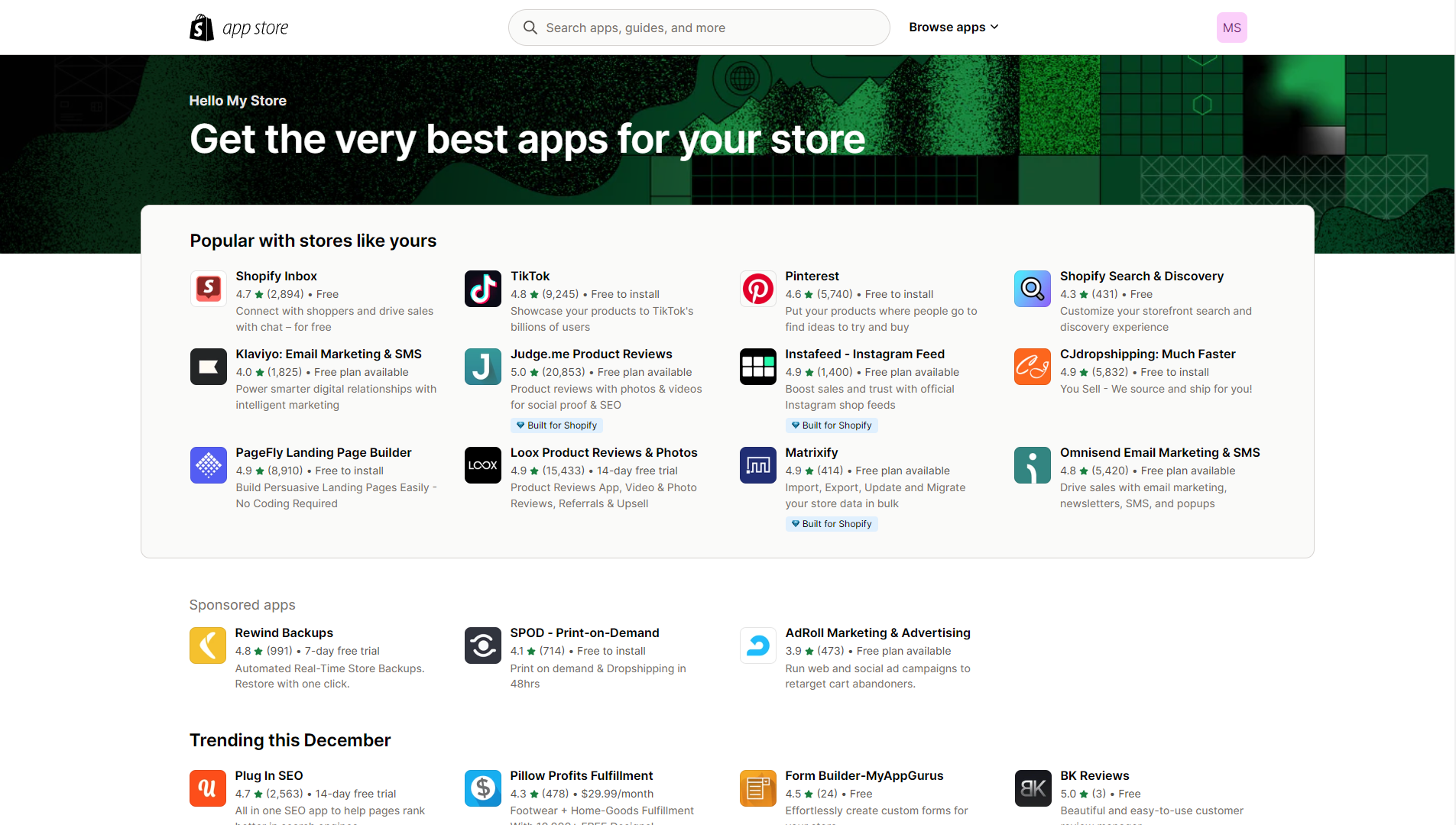
Marketing Features
Design FunctionalitiesRepresents how well each platform allows for creative design and customization of websites.Score Components:
- Template Variety (30%): Range and quality of design templates.
- Customization (30%): Flexibility and options for design alterations.
- User Interface (20%): Ease and intuitiveness of the design process.
- Responsiveness (10%): Adaptability to different devices and screen sizes.
- Innovation (10%): Unique design features and tools.
 8.8
8.8
 6.2
6.2
🏆
Overall Winner: Shopify
. Shopify stands out for its more advanced ecommerce-focused marketing tools, especially in analytics and ad campaign management. Big Cartel, while offering basic marketing features, lacks a blogging feature and relies on third-party integrations for email marketing and ads and promotions.

|

|
|
|---|---|---|
|
SEO Tools |
|
(Basic) |
|
Email Marketing |
|
(Through third-party integrations) |
|
Blogging |
|
|
|
Social Media Integration |
Advanced integration for selling directly on social platforms |
|
|
Analytics and Reporting |
Detailed analytics for in-depth insights |
|
|
Ads and Promotions |
Google Ads integration; sophisticated ad campaign management |
(Using third-party integration) |
Customer Support
Customer supportEvaluates the quality and availability of support options.Score Components:
- Response time (40%): Speed of support responses.
- Support quality (30%): Effectiveness and helpfulness of the support.
- Availability (20%): Range of support channels (phone, chat, email).
- Resource richness (10%): Quality of self-help and educational materials.
 8.6
8.6
 5.4
5.4
🏆 Winner: Shopify
. Shopify outperforms Big Cartel in this category with a customer support score of 8.6 compared to Big Cartel’s 5.4. Shopify provides 24/7 support through chat, email, and phone, along with clear and beneficial tutorials. The extensive community ensures that answers can be found in the numerous forum threads. Additionally, Shopify’s outstanding marketing blog offers valuable information on business growth strategies. For enterprise-level businesses, Shopify steps up its support game with a dedicated program and additional resources to ensure success.
On the other hand, Big Cartel’s customer support team is available Monday through Friday from 8am to 6pm EST. They have twelve members on their support team to assist with various inquiries. However, it’s important to note that Big Cartel does not fulfill orders or control refunds directly, but they do offer resources for these concerns. Unfortunately, Big Cartel does not provide support for enterprises.
Security
SecurityLooks at the platforms’ security measures and data protection.Score Components:
- Data protection (40%): Safeguards for user and customer data.
- SSL and encryption (30%): Implementation of secure connections.
- Compliance (20%): Adherence to industry security standards.
- Regular updates (10%): Frequency of security updates and patches.
 9.0
9.0
 7.3
7.3
🏆
Winner: Shopify
. Shopify’s security measures are more comprehensive and robust, earning it a higher security score. Shopify prioritizes data privacy and security through secure infrastructure, encryption, and limited access. They comply with data privacy regulations, practice data minimization, and ensure user control and transparency. Additional security measures include two-factor authentication, regular audits, and a dedicated incident response team.
Big Cartel also emphasizes the protection of private data and provides SSL encryption for all shops and custom domains. However, it does not achieve PCI compliance on its own, which is a significant consideration for ecommerce platforms. Despite this, Big Cartel does facilitate secure payment processing via third-party PCI-compliant gateways like PayPal and Stripe.
AI Capabilities
AI capabilitiesMeasures the effectiveness of AI-driven features and tools.Score Components:
- Automation efficiency (40%): Impact of AI on streamlining processes.
- Personalization (30%): AI-driven customization for users or customers.
- AI-Assisted design (20%): Role of AI in website design and functionality.
- Data analysis (10%): Use of AI in interpreting user data and analytics.
 7.9
7.9
 0.0
0.0

|

|
|
|---|---|---|
|
Personalized Design |
Shopify AI Builder offers personalized design suggestions |
|
|
SEO Optimization |
AI-driven recommendations for better search engine visibility |
|
|
Customer Behavior Analysis |
Advanced analytics to understand customer preferences |
|
|
Sales Predictions |
AI-powered sales forecasting tools |
|
|
Inventory Management |
AI tools to assist in efficient inventory handling |
|
|
Content Generation |
Shopify’s AI features Content Assistant for content creation |
|
🏆 Winner: Shopify
. Shopify, with a score of 7.9, utilizes AI mainly to enhance the ecommerce experience. Its AI features focus on customer behavior analysis, personalized shopping experiences, inventory management, and sales predictions. Shopify’s AI is powerful and offers a range of tools for online store management.
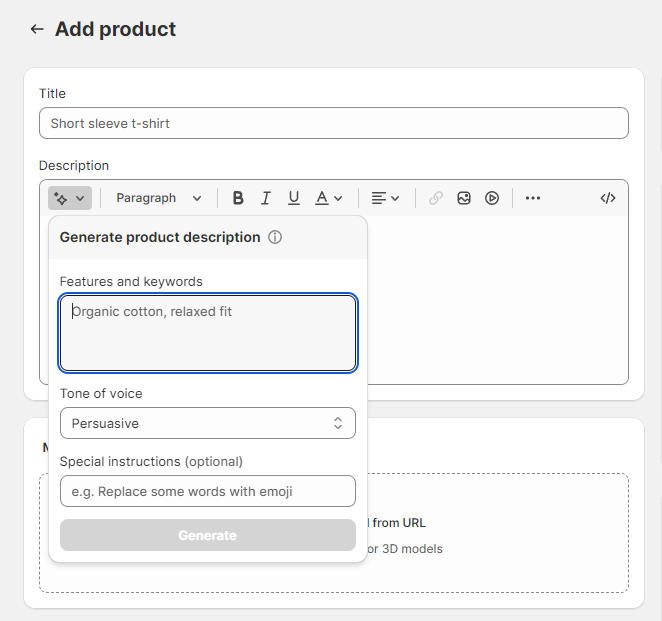
Big Cartel, on the other hand, does not have any AI capabilities. This means that while it may be a suitable choice for those looking for a simple and straightforward website builder, it lacks the advanced features that AI can provide.
User Management
User ManagementAssesses the platforms’ capabilities in managing user roles, permissions, and accessibility.Score Components:
- Role Customization (40%): Flexibility in creating and defining user roles and
permissions. - Ease of Management (30%): User interface and tools for managing users.
- Access Control (20%): Effectiveness of access control measures for different user
levels. - Scalability (10%): Ability to manage a growing number of users efficiently.
 6.5
6.5
 1.3
1.3
🏆 Winner: Shopify
. Shopify offers a more robust user management system compared to Big Cartel.
-
Shopify enforces staff account limits based on plans, ranging from 2 to 15, with Shopify Plus offering unlimited
accounts. Collaborators with limited access are also an option. - Big Cartel, on the other hand, only allows one user to build and edit a website.
Both platforms support simultaneous editing. Shopify uses avatar icons to indicate co-workers.
Shopify User Roles and Access Levels:
| Role | Description | Access Highlights |
|---|---|---|
| Store Owner | Full control over store | Manage products, orders, discounts, payments, apps, settings. Create and manage staff accounts. |
| Staff | Configurable access by owner |
Add/edit products, manage orders, fulfill orders, manage customers, update content. Access level can be customized by the owner. |
| Collaborator | Limited access for external partners | View and manage specific sections like blog or product categories. Cannot access full store settings. |
Big Cartel does not provide different user roles and access levels. It only allows one user to build and edit a website.
Additional Features

|

|
|
|---|---|---|
|
SSL Certificate |
|
|
|
Custom Domain |
|
|
|
Free Custom Domain Included |
|
|
|
International Domains |
|
|
|
Mobile Responsive |
|
|
|
Page Speed |
|
|
|
Website Builder Mobile App |
|
|
|
Convert a Website To An App |
|
|
|
Website Analytics |
|
|
|
Multilingual Sites |
|
|
|
Multiple Users |
|
|
User Feedback
Shopify’s slightly higher rating on G2 Crowd can be largely attributed to its specialization in ecommerce. Its comprehensive features, ease of use, and robust customer support cater specifically to online businesses, leading to high user satisfaction among those seeking a dedicated ecommerce solution.
User feedback on Big Cartel highlights its simplicity and affordability as key advantages, making it a popular choice for small businesses and startups looking to establish an online presence quickly. Users appreciate the ease of setting up and customizing their online stores, the flat monthly fees without per-item charges, and the platform’s intuitive design and mobile management capabilities. However, limitations in features compared to more comprehensive platforms, restricted customization options, and lack of advanced integrations or inventory management for specific items are noted drawbacks. Despite these concerns, Big Cartel is praised for its cost-effectiveness and user-friendly approach, particularly for those new to e-commerce or with smaller inventories.
The making of this blog
We followed a clear, step-by-step process to write and research this article.
FAQ
Which platform is better for small businesses, Shopify or Big Cartel?
Can I use Shopify or Big Cartel without any coding knowledge?
How do Shopify and Big Cartel compare in terms of pricing?
Which platform offers better customer support, Shopify or Big Cartel?
Are Shopify and Big Cartel suitable for selling digital products?










